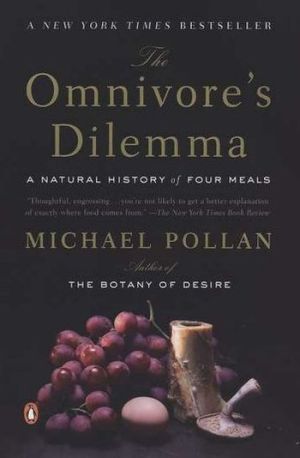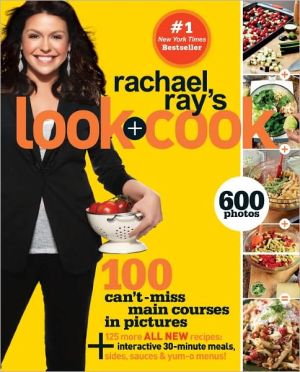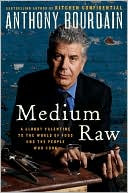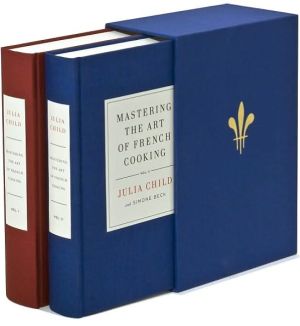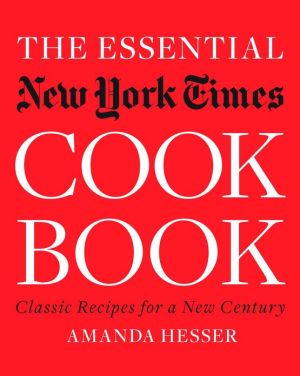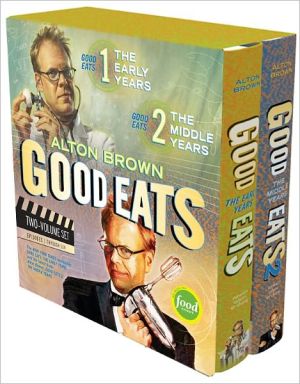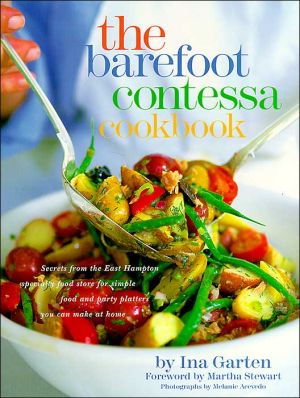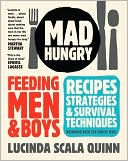The Omnivore's Dilemma: A Natural History of Four Meals
One of the New York Times Book Review's Ten Best Books of the Year\ Winner of the James Beard Award\ Author of #1 New York Times Bestsellers In Defense of Food and Food Rules\ Today, buffeted by one food fad after another, America is suffering from what can only be described as a national eating disorder. Will it be fast food tonight, or something organic? Or perhaps something we grew ourselves? The question of what to have for dinner has confronted us since man...
Search in google:
A New York Times bestseller that has changed the way readers view the ecology of eating, this revolutionary book by award winner Michael Pollan asks the seemingly simple question: What should we have for dinner? Tracing from source to table each of the food chains that sustain us—whether industrial or organic, alternative or processed—he develops a portrait of the American way of eating. The result is a sweeping, surprising exploration of the hungers that have shaped our evolution, and of the profound implications our food choices have for the health of our species and the future of our planet. The New York Times Book Review Thoughtful, engrossing ... You're not likely to get a better explanation of exactly where your food comes from.
Introduction : our national eating disorder11The plant : corn's conquest152The farm323The elevator574The feedlot : making meat655The processing plant : making complex foods856The consumer : a republic of fat1007The meal : fast food1098All flesh is grass1239Big organic13410Grass : thirteen ways of looking at a pasture18511The animals : practicing complexity20812Slaughter : in a glass abattoir22613The market : "greetings from the non-barcode people"23914The meal : grass-fed26215The forager27716The omnivore's dilemma28717The ethics of eating animals30418Hunting : the meat33419Gathering : the fungi36420The perfect meal391
\ From Barnes & NobleIn the ancient days of hunter-gatherers, a wrong food choice -- in the form of a poison mushroom or toxic root -- could have quick and fatal consequences. Today, according to Botany of Desire author Michael Pollan, we face comparable dangers in the midst of plenitude. Pollan notes that Fast-Food America is experiencing what can only be described as a national eating disorder. With compelling precision, he describes how parallel food chains (industrialized food, alternative or "organic" food, and home-gathered food) reflect differences and similarities in our ecology of eating. A fascinating look behind the labels.\ \ \ \ \ The Seattle TimesIf you ever thought 'what's for dinner' was a simple question, you'll change your mind after reading Pollan's searing indictment of today's food industry—and his glimpse of some inspiring alternatives.... I just loved this book so much I didn't want it to end.\ \ \ The Washington PostAn eater's manifesto ... [Pollan's] cause is just, his thinking is clear, and his writing is compelling. Be careful of your dinner!\ \ \ \ \ The New York Times Book ReviewThoughtful, engrossing ... You're not likely to get a better explanation of exactly where your food comes from.\ \ \ \ \ Los Angeles TimesMichael Pollan has perfected a tone—one of gleeful irony and barely suppressed outrage—and a way of inserting himself into a narrative so that a subject comes alive through what he's feeling and thinking. He is a master at drawing back to reveal the greater issues.\ \ \ \ \ Ruth Reichl"Every time you go into a grocery store you are voting with your dollars, and what goes into your cart has real repercussions on the future of the earth. But although we have choices, few of us are aware of exactly what they are. Michael Pollan's beautifully written book could change that. He tears down the walls that separate us from what we eat, and forces us to be more responsible eaters. Reading this book is a wonderful, life-changing experience."\ —Editor in Chief of Gourmet magazine and author of Garlic and Sapphires: The Secret Life of a Critic in Disguise\ \ \ \ \ Mark Danner"Michael Pollan is such a thoroughly delightful writer - his luscious sentences deliver so much pleasure and humor and surprise as they carry one from dinner table to corn field to feed lot to forest floor, and then back again - that the happy reader could almost miss the profound truth half hidden at the heart of this beautiful book: that the reality of our politics is to be found not in what Americans do in the voting booth every four years but in what we do in the supermarket every day. Embodied in this irresistible, picaresque journey through America's food world is a profound treatise on the hidden politics of our everyday life."\ —author of Torture and Truth: America, Abu Ghraib and the War on Terror\ \ \ \ \ Alice Waters"Michael Pollan is a voice of reason, a journalist/ philosopher who forages in the overgrowth of our schizophrenic food culture. He's the kind of teacher we probably all wish we had: one who triggers the little explosions of insight that change the way we eat and the way we live."\ —owner of Chez Panisse restaurant\ \ \ \ \ Eric Schlosser"What should you eat? Michael Pollan addresses that fundamental question with great wit and intelligence, looking at the social, ethical, and environmental impact of four different meals. Eating well, he finds, can be a pleasurable way to change the world."\ —author of Fast Food Nation and Reefer Madness: Sex, Drugs, and Cheap Labor in the American Black Market\ \ \ \ \ Bunny CrumpackerHis book is an eater's manifesto, and he touches on a vast array of subjects, from food fads and taboos to our avoidance of not only our food's animality, but also our own. Along the way, he is alert to his own emotions and thoughts, to see how they affect what he does and what he eats, to learn more and to explain what he knows. His approach is steeped in honesty and self-awareness. His cause is just, his thinking is clear, and his writing is compelling.\ — The Washington Post\ \ \ \ \ Publishers WeeklyPollan (The Botany of Desire) examines what he calls "our national eating disorder" (the Atkins craze, the precipitous rise in obesity) in this remarkably clearheaded book. It's a fascinating journey up and down the food chain, one that might change the way you read the label on a frozen dinner, dig into a steak or decide whether to buy organic eggs. You'll certainly never look at a Chicken McNugget the same way again. Pollan approaches his mission not as an activist but as a naturalist: "The way we eat represents our most profound engagement with the natural world." All food, he points out, originates with plants, animals and fungi. "[E]ven the deathless Twinkie is constructed out of... well, precisely what I don't know offhand, but ultimately some sort of formerly living creature, i.e., a species. We haven't yet begun to synthesize our foods from petroleum, at least not directly." Pollan's narrative strategy is simple: he traces four meals back to their ur-species. He starts with a McDonald's lunch, which he and his family gobble up in their car. Surprise: the origin of this meal is a cornfield in Iowa. Corn feeds the steer that turns into the burgers, becomes the oil that cooks the fries and the syrup that sweetens the shakes and the sodas, and makes up 13 of the 38 ingredients (yikes) in the Chicken McNuggets. Indeed, one of the many eye-openers in the book is the prevalence of corn in the American diet; of the 45,000 items in a supermarket, more than a quarter contain corn. Pollan meditates on the freakishly protean nature of the corn plant and looks at how the food industry has exploited it, to the detriment of everyone from farmers to fat-and-getting-fatter Americans. Besides Stephen King, few other writers have made a corn field seem so sinister. Later, Pollan prepares a dinner with items from Whole Foods, investigating the flaws in the world of "big organic"; cooks a meal with ingredients from a small, utopian Virginia farm; and assembles a feast from things he's foraged and hunted. This may sound earnest, but Pollan isn't preachy: he's too thoughtful a writer, and too dogged a researcher, to let ideology take over. He's also funny and adventurous. He bounces around on an old International Harvester tractor, gets down on his belly to examine a pasture from a cow's-eye view, shoots a wild pig and otherwise throws himself into the making of his meals. I'm not convinced I'd want to go hunting with Pollan, but I'm sure I'd enjoy having dinner with him. Just as long as we could eat at a table, not in a Toyota. (Apr.) Pamela Kaufman is executive editor at Food & Wine magazine. Copyright 2006 Reed Business Information.\ \ \ \ \ Library JournalPollan (journalism, Univ. of California, Berkeley; The Botany of Desire: A Plant's-Eye View of the World) defines the Omnivore's Dilemma as the confusing maze of choices facing Americans trying to eat healthfully in a society that he calls "notably unhealthy." He seeks answers to this dilemma by taking readers through the industrial, organic, and hunter-gatherer stages of the food chain. Focusing on corn as the keystone plant in the industrial stage, Pollan describes its role in feeding cattle and in food processing as well as its ultimate destination in the products we consume at fast-food restaurants. The organic, or pastoral, stage offers a pure and chemical-free eating environment for animals and humans. In the hunter-gatherer stage, omnivores hunt animals and gather the plant foods that comprise all or part of their diets. Pollan explains how a framework of environmental, biological, and cultural factors determines what and how we eat. Although a bit long and sometimes redundant, this folksy narrative provides a wealth of information about agriculture, the natural world, and human desires. Recommended for all omnivores. [See Prepub Alert, LJ 12/05.]-Irwin Weintraub, Brooklyn Coll. Lib., New York Copyright 2006 Reed Business Information.\ \ \ \ \ Kirkus ReviewsThe dilemma-what to have for dinner when you are a creature with an open-ended appetite-leads Pollan (Journalism/Berkeley; The Botany of Desire, 2001, etc.) to a fascinating examination of the myriad connections along the principal food chains that lead from earth to dinner table. The author identifies three: the one controlled by agribusiness; the pastoral, organic industry that has sprung up as an alternative to it; and the very short food chain Pollan calls "neo-Paleolithic," in which he assumes the role of modern-day hunter-gatherer. He demonstrates the dependence of the agribusiness system on a single grain, corn, as it passes from farm to feedlot and processing plant. The meal that concludes this section is takeout from McDonald's and includes among other foods a serving of Chicken McNuggets. Of the 38 ingredients that make up McNuggets, 13, he notes, are derived from corn. This fact bolsters an earlier, startling statistic: Each of us is personally responsible for consuming a ton of corn each year. Pollan's exploration of the pastoral food chain takes two roads. Investigating "industrial organic," he assembles a meal composed entirely of ingredients from a Whole Foods supermarket. But he also visits a single, relatively small farm in Virginia's Shenandoah Valley, where grass, not corn, is the basis of production, and cattle, chickens and pigs are raised through management of the natural ecosystem. Pollan joins in the farm work and is clearly impressed by what he learns, observes and eats here. In the final section, he learns how to shoot a wild pig and how to scavenge for forest mushrooms. The author's extraordinarily labor-intensive final meal provides a perfect contrast to thefast-food takeout of Part I. Pollan combines ecology, biology, history and anthropology with personal experience to present fascinating multiple perspectives. Revelations about how the way we eat affects the world we live in, presented with wit and elegance.\ \
